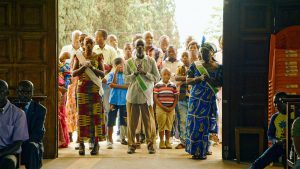Geenen et al in Africa is a country:
 How can arts respond to conflict, human rights violations and impunity? What role can they play in peace building and reconciliation? These questions are raised by Milo Rau’s Congo Tribunal, a multimedia project, consisting of a film, a book, a website, a 3D installation, an exhibition in The Hague and, most centrally, a performance that took place in Bukavu and Berlin. The project has an ambitious bottomline: “where politics fail, only art can take over.” The failure of politics, in this case, lie in the blatant impunity and perpetuation of the violence that engulfs eastern Democratic Republic of the Congo (DRC) since more than twenty years. Milo Rau is very explicit in his political aims, stating:
How can arts respond to conflict, human rights violations and impunity? What role can they play in peace building and reconciliation? These questions are raised by Milo Rau’s Congo Tribunal, a multimedia project, consisting of a film, a book, a website, a 3D installation, an exhibition in The Hague and, most centrally, a performance that took place in Bukavu and Berlin. The project has an ambitious bottomline: “where politics fail, only art can take over.” The failure of politics, in this case, lie in the blatant impunity and perpetuation of the violence that engulfs eastern Democratic Republic of the Congo (DRC) since more than twenty years. Milo Rau is very explicit in his political aims, stating:
as a reaction to the passivity of the international community to the systematic attacks against the civil population, [the tribunal] was designed to counteract the decades of impunity in the region.
In the film, footage from the hearings in Berlin is mixed with images from Mutarule, Twangiza and Bisie, the cases under investigation, but the bulk of the film reports on the Bukavu hearings. In this eastern Congolese town, a three-day fictitious tribunal was set up, bringing together various actors of the Congolese conflict, including the victims, witnesses, civil society, opposition and government actors as well as other observers. Victims and human rights advocates spoke out about the role of government and the UN in massacres, about conflict minerals and forced displacement, divided into the three aforementioned cases.
More here.
